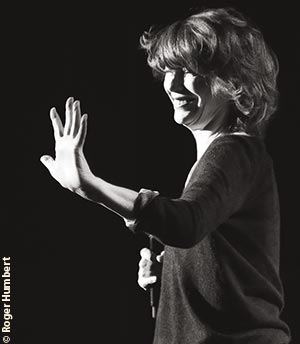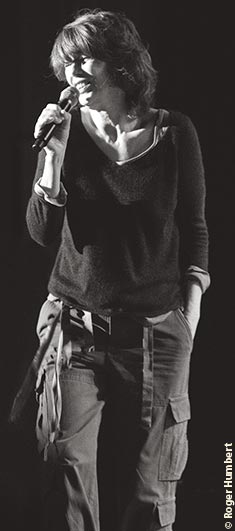
|
Jane Birkin
presented by Gary Topp |
|
| February 25, 2008 • The Danforth Music Hall • Toronto |
|
|
|
|
|
|
Just Plain Jane B.
by James Tay with photos by Roger Humbert |
| Before an assembly of the faithful and the curious, Jane Birkin opens her Hermesian handbag of song-craft. From it, she presents selections from the latest in a storied discography, Fictions of 2006, and 2004’s Rendez-Vous, featuring covers of and collaborations with the likes of Beth Gibbons, Neil Hannon, and Tom Waits. And in the main compartment, the Gainsbourg legend of lore and song which she graciously carries as the daughter of an adopted country, the torchbearer for its cultural native son. The hall fills with nostalgia.
Nostalgie: l’éthéré rendu essentiel…. the ethereal made essential… spanning thematically in film from almost twenty years ago in Daddy Nostalgia, to her directorial debut of 2007, Boxes….
If Jane Birkin, artiste of screen, stage and song, is a cultural icon as the embodiment of nostalgia, then she stands before us as the messenger and the message — both symbolic and sincere, as artifice and authenticity.
|
|
Artifice: the fashion model of Swinging London in the 60’s, the muse for the French revolution of the twentieth century — all the blow-ups and flashbacks of a bygone era, she brings to life with authenticity.
Authentic… like her casual garb of black long-sleeve jersey and green cargo pants, more tomboy than sex kitten… like her beautifully wide smile beaming gratitude… like the wireless trip up and back down the full length of the auditorium’s aisles during the rumba-spiced “Sans Toi” (song by Cali, a current French pop star), complete with heart-warming hugs. Another example is her confession of singing from a phonetically transcribed cheat-sheet for “O Leaozinho” (by Caetano Veloso, the Brazilian Tropicalista), and inviting lessons from a Portuguese spectator in the front row. Exemplary too is the self-composed “Aung San Suu Kyi” — rallying support for the Nobel winning prisoner-in-her-own-land — a song prefaced with the exhortation that “people matter”.
|
|

Jane Birkin |
|
| Her people do matter. Obvious throughout the evening is the genuine appreciation for her crew. This is evident in the rollicking duet with the engineer at the soundboard at the back (now, how often have you witnessed this?), in “Je m’appelle Jane” (by Michel Furnon of the French group, Mickey 3D), which also features a daring instrumental turn on the kazoo.
Among “her people”, she counts Gary Topp, the local concert promoter ruled more by personal passion than return on investment who presented Toronto with such a rare occasion. She continually shows much respect for the super talented trio of musicians supporting her, multi-instrumentalists all who slip effortlessly in and out of roles assigned by Franck Eulry, the songs’ arranger — Christophe Cravero on piano and violin, Frederick Jacquemin on percussion and bass, and Thomas Coeuriot on guitar, mandolin, harp and keyboard; the latter two shared keyboard duties. The palette is thus exquisitely simple yet full of colour — here, gypsy jazz and there, piano accompaniment only — with which to paint the Cezanne-like canvas of her voice — so rich yet sometimes barely there.
|
|
No, Jane Birkin’s voice is not a bum-pinched soaring three-octaves. It could perhaps be described as fragile, with the tension of breaking when it stretches — the perfect vehicle for the taut emotionality of a fragile heart exuded in classic Gainsbourg such as “Le moi et le je”, and “Fuir le bonheur”. Or perhaps called frail, like her slim frame, or the unbearable lightness in memory of child-like innocence, as with “Di Doo Dah” or “L’aquaboniste”. Her voice may not be a mechanically trained instrument, but it is a very human one.
Authentic… as her humanitarian advocacy, such as the impassioned plea aforementioned for the plight of the Burmese, and the vigilance of her web site for also the Chechnyan in Russia. And as humane as her anecdote about an afternoon’s observation on Toronto’s profusion of strangers-in-another-land, kinship on tour and at home: how happy they seem, and how this is indisputable proof of our kindness to strangers. We come to remember from a witness to another time and another place, and we leave with a reminder of how to act towards our neighbour tomorrow and the next day.
Similarly, this review of that concert is not a mere recount of the all-time favourite and scandalous delivered in the song list. More than anything, I encourage the reader to check her recent catalogue (and especially, grab a copy of Arabesque, the phenomenal document of a concert with Gainsbourg’s songs set to Algerian Rai), look for the DVD release later this year of her self-directed Boxes, and keenly anticipate her next CD which will showcase compositions of her own writing as well as voice. This is testimony of an evening when we may have enjoyed a legendary performer who is much loved by many, but we were also in the company of someone who is very loving — just plain Jane B.
|
|

Jane Birkin |
|
|
The band
Jane Birkin – vocals
Christophe Cravero – piano and violin
Frederick Jacquemin – percussion and bass
Thomas Coeuriot – guitar, mandolin, harp and keyboard
www.janebirkin.net
In her spirit, the writer adds for reference
www.avaaz.org
|
|
|
|
|
|



